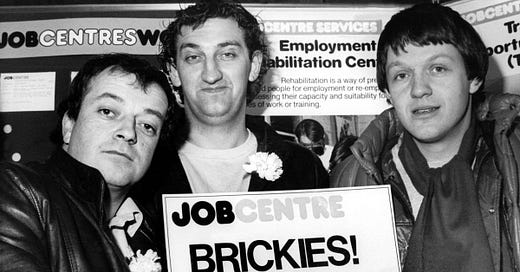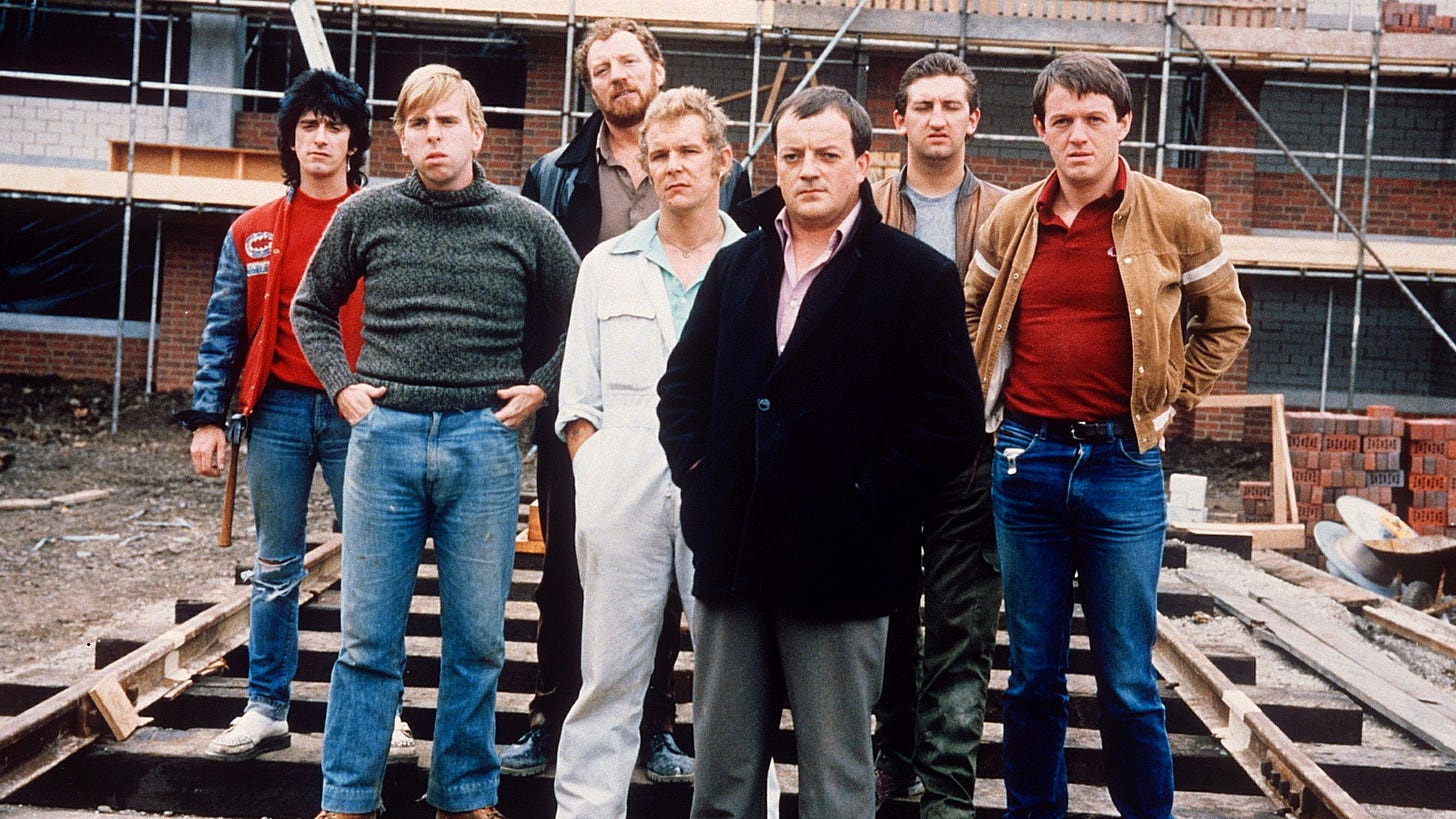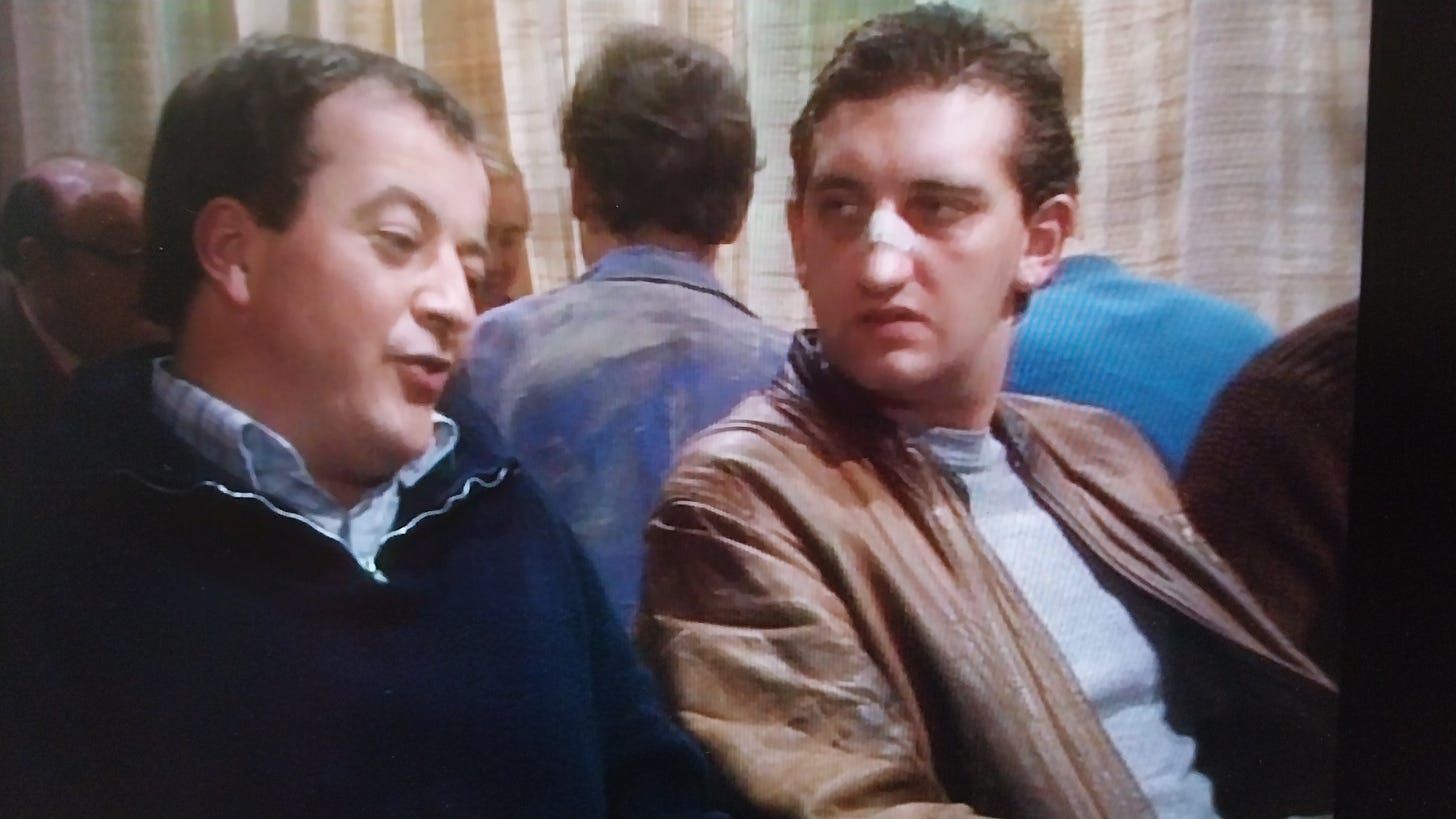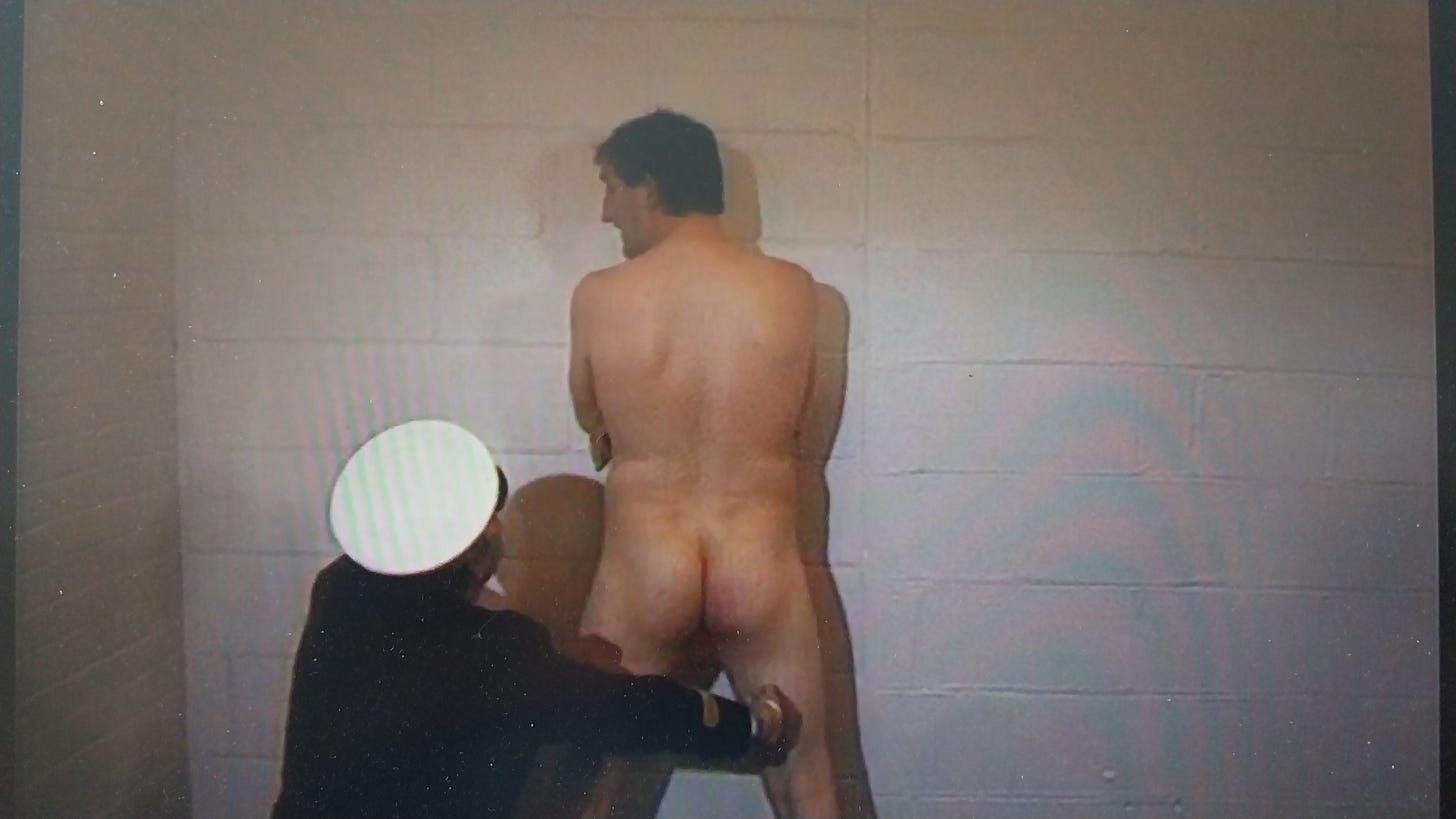Intro
An unfeasibly young-looking Tim Healey, Jimmy Nail and Kevin Whately in a 1983 publicity shot for a new series about Geordie builders working in Germany.
In 1983, Auf Wiedersehen, Pet, the story of the experiences of seven migrant workers forced by circumstances to leave their home country to work, captured the imagination of the nation.
Part drama, part comedy and part soap opera, the show’s simple formula had three Geordies travelling to Dusseldorf, Germany to work on a construction site, the accommodation provided being a hut on the building site where they worked, shared with four other Brits.
They’re happy enough with the work, which comes with the advantage of them being “on the lump”, ie, paying no tax, so the financial rewards are good. Job security, not so much, though.
The after-work boredom is punctuated by playing games of international football against the German and Turkish workers, and not very much else apart from “nights with the boys in a bar full of noise” as the closing theme tune has it.
There are ructions at first but gradually the seven form a kind of extended family. “Bonds formed in adversity” as the enthusiastic Brummie autodidact Barry puts it more than once.
This show really hit home for anybody who ever had to work away from home, and the families they left behinds.
Sometimes a TV show really nails the zeitgeist, to use an appropriately German word.
Breaking Away
Franc Roddam, like Ian La Frenais a native North-Easterner, directed the 1979 movie Quadrophenia, which used the Who’s sprawling, unfocussed 1973 rock opera as the starting point for a film about Mods in the sixties.1
His next big idea was for a series based on the adventures of English builders forced to work abroad.
I remember in the late 70s going home to Stockton-on-Tees to see my buddies, but there was nobody there.
They’d all gone to Germany to work because there wasn’t any work in England any more.
They were living on building sites, with Greeks and Turks, in huts. I went to visit them, all these different characters together, and it reminded me of war movies; they’d joke about escaping.
On a political level, and a psychological one, I thought this was interesting, and could make for good television.
Clement and La Frenais loved the idea. The format was an ITV hour of 48 minutes, give or take. Although they had by this point written films (see a future article) this was a longer television format than the half-hour sitcoms they had become famous for.
This is Ian La Frenais’ take on Auf Wiedersehen, Pet.
What appealed to Dick and me was the fact that the workers were housed in hostels, or, better still, huts on the site.
It reminded us of POW camps from Second World War films, the irony being that the reason the Brits were there now was to rebuild some of the cities their dads had flattened in the first place!
And it was the perfect captive situation, which so much of our work has celebrated. Likely Lads Bob and Terry, trapped by their environment and class barriers. Fletch and his fellow lags in Porridge, prison being the ultimate captive situation.
And now: a hut in Germany, with disparate characters trying to forge liveable relationships with total strangers in suffocating circs.
Germany had used mainly Turkish temporary migrant labour - “gastarbeiten” - for years, but it was different now.
Us Brits were the immigrant workers.
Why Aye Love It
The Magnificent Seven on the building site in Dusseldorf.
(L-R) Wayne, Barry, Bomber, Moxie, Dennis, Oz, Neville.
Dennis Patterson (Tim Healy) is the reluctant leader of the group, with several tours of duty working in Germany under his belt. He keeps his marital difficulties from the rest of the lads.
Neville Hope (Kevin Whately), not long married. Both he and his wife have difficulty adjusting to him working away.
Leonard “Oz” Osborne (Jimmy Nail), in Germany mainly to get away from his estranged wife Marjorie who is pursuing him for maintenance money.
Barry Taylor (Timothy Spall), an often oversharing Brummie, font of a thousand “interesting facts”
Wayne Norris (Gary Holton), a chirpy, cocky Cockney, seemingly on a mission to sleep with every woman he meets.
Albert Moxey (Christopher Fairbank), an arsonist from Kirby, on the run from prison.
Brian “Bomber” Busbridge (Pat Roach), a gentle giant and part-time professional wrestler.
We love these seven guys because they’re a gang of adults, bonding in a way that is impossible for men to do in general.
A couple of years earlier, playwright Alan Bleasdale’s “Boys From The Blackstuff” series had brilliantly detailed the plight of jobless workers in Liverpool. Hard-hitting, serious and uncompromising, there were previous few laughs to be had there as that wasn’t Bleasdale’s intention. 2
The central plot of Auf Wiedersehen, Pet was dependent on the then-current changes going on in Britain, with building projects among the many things subject to government cuts in services to clear the way for cuts in taxes, but the stories were lighter.
Politics, while sometimes referred to, was far from the be-all and end-all. It was mostly about working-class blokes getting on with life as best they could, in “difficult circs”. Any political comments came up naturally.
Season One - Strangers In A Deutsch Land
Dennis tells Oz some home truths.
“I've seen blokes like you come and go all the times I've worked in Germany. Never been out the UK before.
Never eaten foreign food, never drank foreign beer. Fish out of water without the wife or the mother to lend a guiding hand.
After a week they've lost their passports, they've got pissed, lost most of their money, and become ridiculously nationalistic for the country that can't even bloody employ them in the first place!”
The vast majority of the thirteen episodes comprising the first season of Auf Wiedersehen, Pet are stand-alone stories, structured in three acts with the first act setting up acts two and three, which tend to follow the pattern of a traditional shorter sitcom. There are similarities with Minder, only with better defined characters.
There are so many familiar storylines here, but told with such affection and veracity that you can’t help but love them. Yes, many involve drinking too much, obviously.
The one where Neville wakes up with a hangover and a tattoo reading “Neville and Lotte”, without the faintest idea of where he’s been, or indeed who Lotte is (we never find out).
The one where Oz goes to a football match in Belgium, drinks too much and wakes up on a plane back home to Newcastle.
My favourite is Episode 10 “Last Rites”, which is classic Clement and La Frenais and contains just about everything I love about the show.
By this time, the characters have become your best mates.
Oz accidentally breaks Bomber’s hand on the site while distracted by trying to persuade him to join him in a business venture involving smuggling hardcore pornography into the UK.
While visiting Bomber in hospital, Dennis and Neville befriend Hedley, an old English immigrant, bitter at the way the British army has treated him, and on his deathbed.
When Oz hears of this he is adamant that the old fella should be buried back home, and starts a collection among all the workers on the site to raise the funds to make it happen. Neville and Dennis are amazed and moved at seeing a new, caring side to Oz’s nature, not knowing he is planning to hide the XXXX-rated videos in the coffin.
Wayne, back in England for a family wedding, goes to see Hedley’s last surviving relative, his sister who unexpectedly tells Wayne that Hedley was in fact a horrible man who was dishonorably discharged from the Army for “selling headlights to the Russians”, and that she wants nothing to do with disposing of his remains.
Oz hitches a lift back to the UK only to find that Hedley’s body never reached Blighty. Wayne phoned Dennis to tell him to have him cremated in Germany, along with Oz’s videos.
It’s hard to pick out individual episodes because the whole thing is very much one big set of experiences - I’d strongly recommend just watching the lot.
Season Two - Strangers In Their Own Land
Oz is unimpressed at his welcome home to Britain.
Oz: Yer kna the reason I left this country in the first place, divven't you, eh? I'll tell you.
In a word, Margaret bloody Thatcher, that's why. Because I'd had it, I was up to there with what she'd created. Bloody wasteland. Desolate. Nae joy, nae hope, nae nowt.
Where kids get to twenty-one and have never done a day's work in their life. Honest men have to gan out thieving to feed their families. Young bairns can buy heroin in the bike sheds at school. Oh, dear.
But I thought, "Nah, nah, nah. It's got to be getting better. It cannae be as bad as what it was, can it?" I was willing to give you lot the benefit of the doubt on this one, yer kna. But nah, nah, nah. What happens? What happens is I've been back on me native soil for fourteen minutes, and I'm subjected to this act of fascist intimidation! 'Cos that's what it is, yer kna! That's what it is, and I'll be writing to me MP aboot this!
Customs Officer: [Putting on a glove] Spread.
Oz: What do you think you're going to find up there, eh? A new striker for Newcastle United?
When the time came for the second series, the incredible popularity of the show meant that this time, there were big expectations.
The above is the first time we see Oz in the second series. Jimmy Nail described Season 2 as “an unmitigated disaster” in an interview and Ian La Frenais is similarly ambivalent about it.
Far be it from me to disagree with creators and actors I admire but I reckon it's well worth a watch.
Thatcherism had taken hold by this time, and Season Two is a bit more politically aware than Season One, with Oz’s speech above while being strip-searched an excellent example.
There’s also the implicit criticism of the get-rich-quick attitude and lifestyle of Dennis’s dodgy boss Ally Fraser, who employs the lads throughout.3
There’s the first of the two main story arcs with the Magnificent Seven working on a stately home in rural Derbyshire and encountering some class-based “get off my land”-style hostility from some of the locals. The other, happier side of the coin is that a couple of the boys find that some of the local women are quite keen on a bit of rough.
The second arc involves the guys travelling to Marbella - Spain’s Costa Del Crime - to do up Ally’s villa, and coming into contact with expat Brit villains and a foreign Prince.
The original concept of seven guys, mostly strangers, thrown together in a hut pretty much writes itself. The second season idea of seven mates getting the band back together does not flow quite so obviously, and it is undeniable that some of the plots seem a little forced.
Gary Holton’s sad death before completing filming the Spanish segment of the story was a crushing blow to cast and crew. They’d completed all the outdoor Spanish scenes but not the interiors, so there were three or four episodes of Wayne being forever in the foyer chatting up the receptionist, or off chasing birds in some pub, all in line with the character though!
When The Boat Goes Out
The first season of Auf Wiedersehen, Pet stands up as one of the finest pieces of eighties British working-class television, for my money only beaten by Boys From The Blackstuff (and Pet has aged far better).
It struck a massive chord with viewers on its first broadcast.
The second season stands up well on rewatching now. Sure, there’s a drop in quality, but you could say the same about many things, Fawlty Towers included.
It was another sixteen years before we got to see how the characters were getting on as they got older and, in some cases, wiser, but that’s a tale for another day.
Seasons One and Two of Auf Wiedersehen, Pet are on ITVx in the UK.
Previously in this series:
Sitcoms 1964-1974 (The Likely Lads, Thick As Thieves, Whatever Happened To The Likely Lads?
Porridge and Going Straight (1973 - 1978)
It’s way better than the album for my money, which always disappoints me as a fan of the band. I mean, why make a record that deals with the Mods who followed the band in the early to mid 60s, if you’re going to do it in a faceless heavy metal style? With synthesisers!
Although The Black Stuff, the BBC Play For Today which spawned the series was considerably lighter. It’s very hard to find nowadays. If you do manage to locate a copy, then I’d love to borrow it.
Since rewatching the show, I’m struck by Ally Fraser’s similarity to former Dragons’ Den curmudgeon Duncan Bannatyne, who was living in Ian La Frenais’ home town of Stockton-On-Tees at the time and did make a lot of money (legitimately, I hasten to add) doing up old houses and converting them into old folks’ homes and health clubs.
Pretty he’s never been involved in gangster activity, mind, although it has to be said that given the choice, I’d sooner cross Fraser than mess with Bannatyne.







Great article Tony. You're spot on in saying that the series resonated with families like my own. My dad found himself unemployed in late 70's despite being in a skilled profession (structural draughtsman). He ended up in Stavanger and Oslo, working in oil industry living in flats with other lads, of different ages. Many of whom had never been abroad before. Dad is now 83 but still meets up once a year with lads he worked away with. Strong bonds were obviously formed. The series captured that spirit and resilience.
Brilliant stuff, what a great read 👏